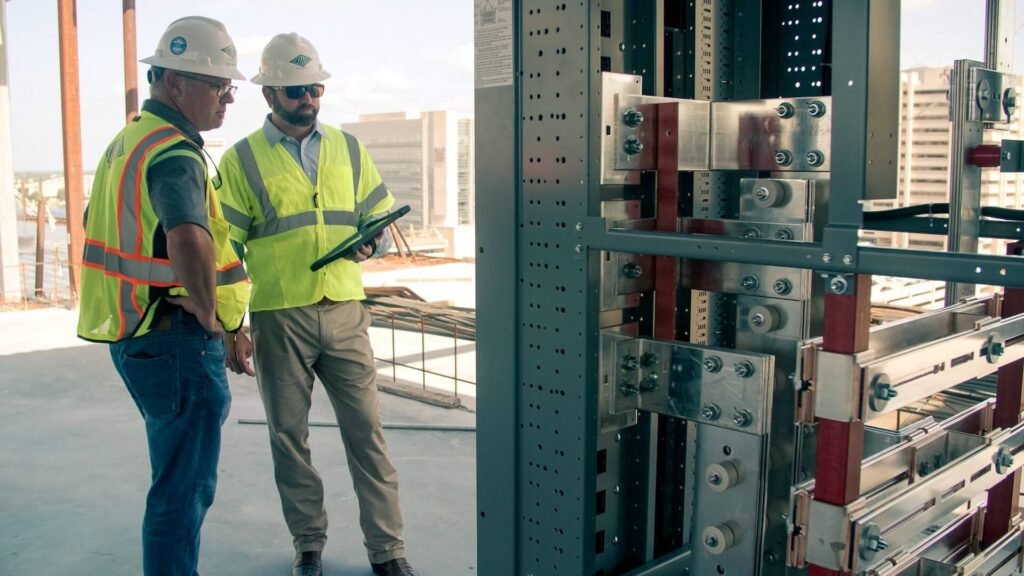Modern businesses and industrial units need an industrial facility’s electrical systems are usually one of the most sophisticated and important systems. Whether it is an expansive industrial plant or a commercial building, having an industrial control systems expert is necessary for the complex systems of power distribution and automation. During such critical times, electrical contractor businesses are of great importance.
In the prevailing industrial environment, stakeholders face the highest challenges and risks. Increased spending for idle production due to equipment failures, huge expenses due to an industrial accident, and a shut down due to a noncompliance are a few of them. Any serious industrial player in need of a contractor for electrical projects, will prioritize an effective solution to issues derived from poor project execution.
Only seasoned, professional contractors can provide the expertise modern electrical systems require. These aren’t needing residential wiring jobs – they are complex engineering problems that need specialized tools, a wealth of experience, and in-depth knowledge, especially when dealing with industrial-grade systems.

The Foundation of Professional Electrical Contracting
Technical Expertise That Goes Beyond Basic Electrical Work
Unlike general electricians, professional electrical contractors work in an entirely different arena. While an average electrician can perform simple wiring and maintenance, an industrial electrical contractor must be well-versed in sophisticated power distribution systems, motor control centers, variable frequency drives, and building automation systems. These professionals work with high-voltage systems that are, quite literally, dangerous to life if not correctly managed.
Working in this industry requires a unique set of skills. Electric engineering companies hire professionals who have not only deep knowledge in electrical theory but also in mechanical systems, computer networking, and the industrial world. For instance, an electrical engineer in charge of a production line must understand how the electrical systems of a manufacturing line integrate with its mechanical systems, how sensitive electronic devices are influenced by power quality, and how to design systems that thwart the risk of catastrophic failures.
Understanding the newest advancements in technology for industrial automation is also an area of specialization. Modern production plants utilize programmable logic controllers, human-machine interfaces, and advanced monitoring systems. Because these technologies are constantly changing, professional contractors are sure to stay updated so their clients receive the most beneficial and advanced solutions.
Regulatory Compliance and Safety Standards
Like any other industry, industrial electrical work has strict geographical regulations. As with any professional electrical contractor, they also have to comply with local licensing requirements, local electrical codes, international IEC standards, as well as sector specific regulations for industries like manufacturing, mining, and telecommunications in East Africa.
Compliance with safety regulations for rough industrial electrical work is mandatory. There are specific safety requirements for high voltage systems, dangerous areas, and sensitive systems. Professional contractors develop detailed safety management systems, perform safety audits, and conduct safety training on record keeping for safety procedures.
The ramifications of disregarding safety protocols are extreme. Serious injuries or loss of life can be caused by arc flashes, critical system electrical failures can result in environmental catastrophes, or create public safety emergencies. With their extensive industry experience, professional contractors are well aware of these dangers and consequently implement multiphase risk prevention measures.
Quality Assurance and Project Management Excellence
Systematic Approach to Complex Projects
Large scale electrical projects need highly developed sophisticated project planning and execution. Professional electrical contractor businesses have project managers who deal with complex issues of electrical installation. They deal with other trades, oversee material delivery, and make sure all electrical work is done on time.
Quality control in professional electrical contracting firms goes beyond simple checks. These firms have developed project-based quality management systems, which control all phases of a project from design review until commissioning. They conduct quality audits, document all processes in detail, and have system performance, and verify using specialized equipment to systems performance testing.
Today’s electrical projects are multi-faceted and require planning, coordination, and careful precision. Professionals cite that a singular error in the design phase can have a domino effect, delaying timelines and increasing costs. Specialized contractors employ tried and tested methods to minimize these risks, comprehensive project planning, system testing, detailed design reviews, and systematic testing protocols.
Advanced Testing and Commissioning Capabilities
Professional electrical contractors make comprehensive investments in specialized testing equipment. Commissioning a modern electrical system requires specialized instruments that can verify everything from continuity to complex protective relay settings. Established contractors can afford these equipment since it is a significant investment.
Handling the commissioning process demands unique knowledge and skills. In the context of the commissioning process, high voltage testing needs to be performed by a trained technician with knowledge of both the equipment and the testing process. Professional contractors employ certified personnel who, along with the requisite qualifications, have years of experience with specialized systems and testing processes.
In the commissioning process, documentation helps with maintenance and troubleshooting the system in the future. Professional contractors prepare detailed test reports, system documentation, and training reports, which facility operators require to efficiently manage the systems, ensuring that all systems within the facility are functioning optimally.

Long-term Partnership and Support
Ongoing Maintenance and Support Services
Working with a professional electrical contractor company begins prior to, but extends far beyond project completion. In addition to establishing the systems, professional contractors make sure that the industrial electrical systems are maintained on a regular basis, tested, and upgraded as needed. Established contractors offer the maintenance programs which aid in avoiding equipment failures and prolonging the systems life.
Working with professional contractors has its advantages, one being the ability to maintain equipment with a predictive approach. Predictive maintenance uses available technologies including thermal imaging, vibration analysis, and power quality monitoring to find issues before they result in equipment failures. This approach goes a long way in averting expensive downtimes while also extending the life of the equipment.
Emergency support services are another critical advantage. Professional contractors have emergency response strategies, including 24/7 availability, and pre-emptive stocking of vital electrical system components which aid in drastically reducing system downtime.
Technology Evolution and System Upgrades
As with any other branch of industry, industrial electrical systems need to adapt to new technology and business practices. Professional contractors help clients in these areas by advising them on system upgrades and the placement of new technologies within the company’s operational architecture.
Interventions of The Internet of Things and the Industry 4.0 Project are giving new directions to industrial electrical systems. Professional contractors are aware of these trends and, in addition, are able to assist their clients in adopting smart technologies that improve efficiency and operational visibility.
As with everything else in the world, industrial electrical systems are grappling with the problem of cybersecurity. The greater the number of connections in a system, the greater the risk of it being vulnerable to cyber-attacks. Professional contractors are aware of these risks and take necessary measures to enforce protective security to critical infrastructure.
Making the Right Choice for Your Business
Evaluating Contractor Capabilities
Technical skills of a contractor to be hired determines the contractor’s electrical skills, and this is the first thing to look at. Make sure the electrical contractors are employing certified engineers, with up to date certifications and with a history of projects that are the same or similar to yours.
As in any business, look at their collection of completed works, and from them, look for any clients that you think are familiar with them and have a discussion on their experiences with the contractors.
Financial stability is another crucial factor. Electrical projects often require heavy investment in materials and labor. Contractors need to have the sufficient financial resources to sustain their cash flow through the duration of the work. Established contractors backed with strong finances are better positioned to successfully complete projects.
The Cost of Cutting Corners
Look for contractors who have implemented formal quality management systems with relevant certifications and demonstrated their commitment to ongoing enhancement. Such contractors are dedicated to continuous improvement and their formal systems demonstrate a commitment to excellence.
While professional certified electrical contractor services may appear pricey at first, the cost of unqualified contractors in the long term can be devastating. Poor workmanship results in systems failures and safety incidents, and may lead to violations of compliance regulations which incur costs far greater than the superficial savings.
Over the contractor evaluation stage, insurance and liability management is often ignored. Professional contractors, however, have insurance and liability management that protects clients in the event of accidents or system failures. In contrast, unqualified contractors may leave clients exposed to significant financial risk due to inadequate coverage.
Working with cheap contractors may save you some money upfront, but dealing with rework, system failures, and further complications will cost you in the long run. Working with professional contractors means you will not have to incur the costs and delays associated with correcting substandard work.
Conclusion

Maintaining the electrical infrastructure of an industry is a significant investment, and the proper electrical contractor provides the investment with the professional insight it needs. They not only provide the necessary technical knowledge, but work with the facility long-term to provide quality assurance and steady support.
Given the strict regulatory guidelines and safety requirements, modern electrical systems are complicated and demand a professional contractor. Safety incidents, regulatory violations, and system failures are an unmeasurable cost, and an investment in a professional electrical contractor pays for itself in no time.
IET has proved itself as a leading company in electrical engineering for the last seventy years, serving customers in Kenya, Uganda, and Tanzania, from IET’s head office in Nairobi, Kenya. IET’s staff of more than 150 professionals has vast experience and specializes in the areas of power transmission and distribution, automation of industries, and building management systems. IET has proven to be a reliable partner in resolving complex projects aided by their engineering professionals and their IET guarantee of quality solutions; hence, IET is willing to assist you with the industrial facility that you need. Reach out to us now and learn more on the impact of our solutions on your company development.
